Charles E W Bean, Diaries, AWM38 3DRL 606/261/1 - 1929 - 1930 - Part 1
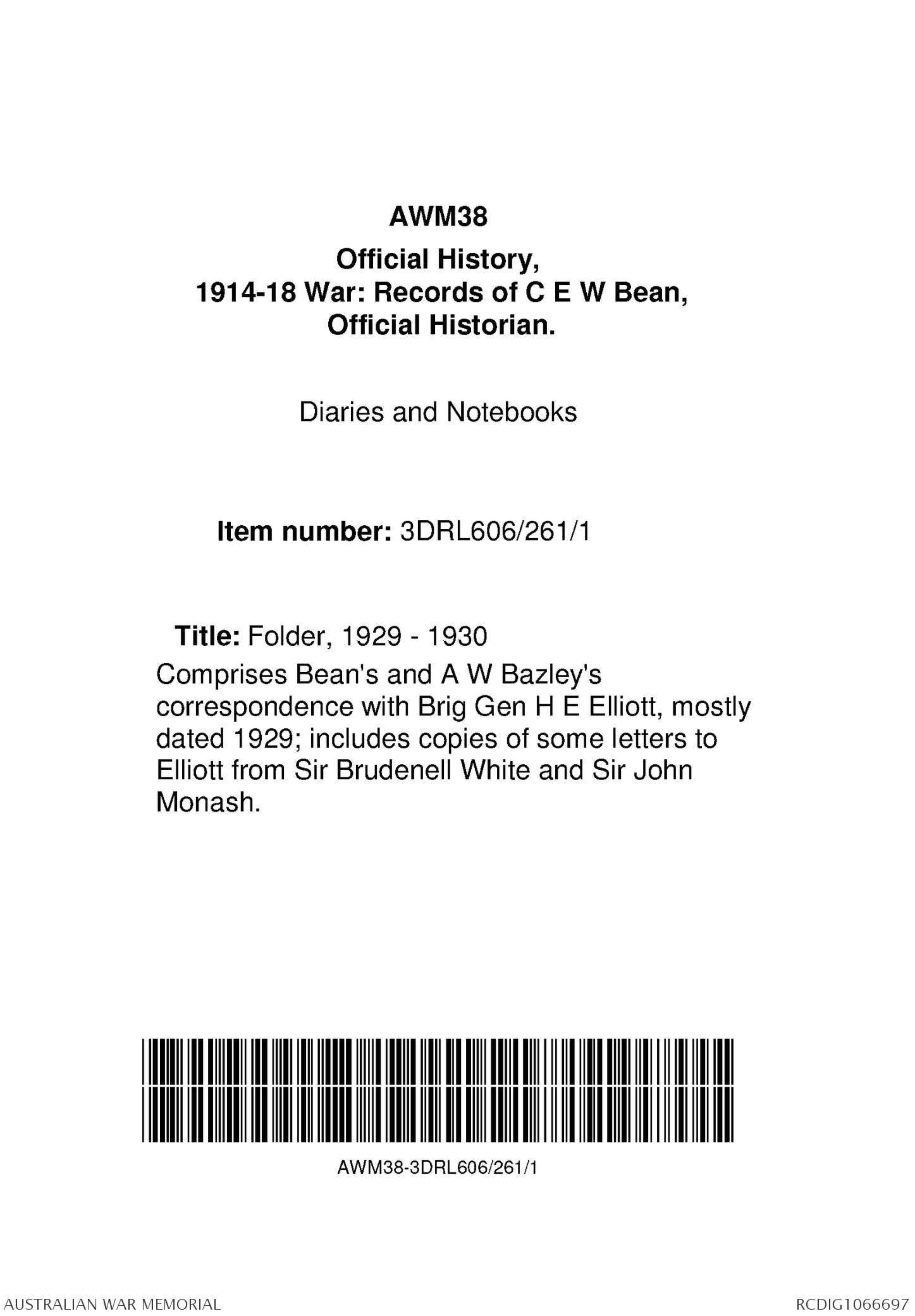
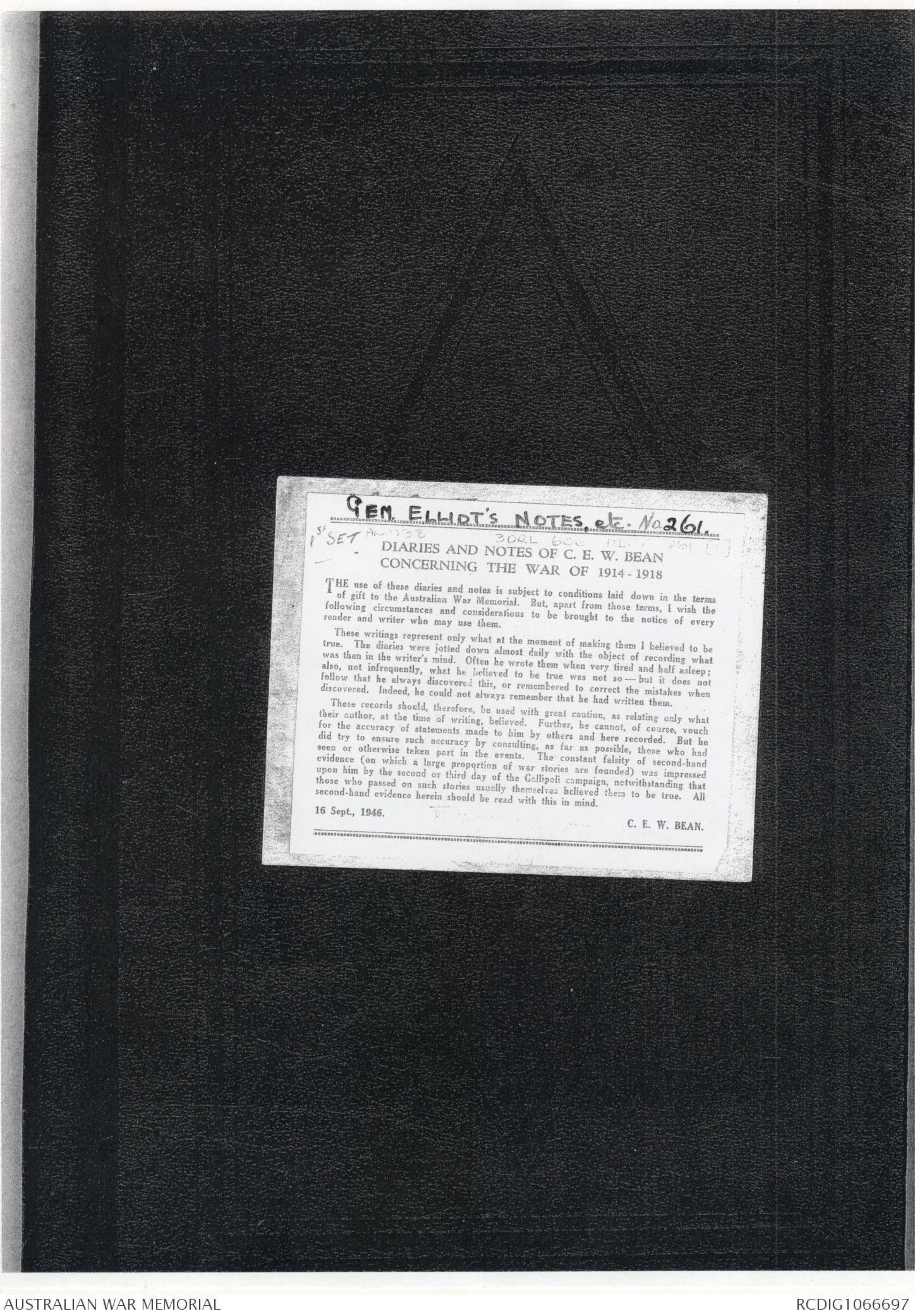
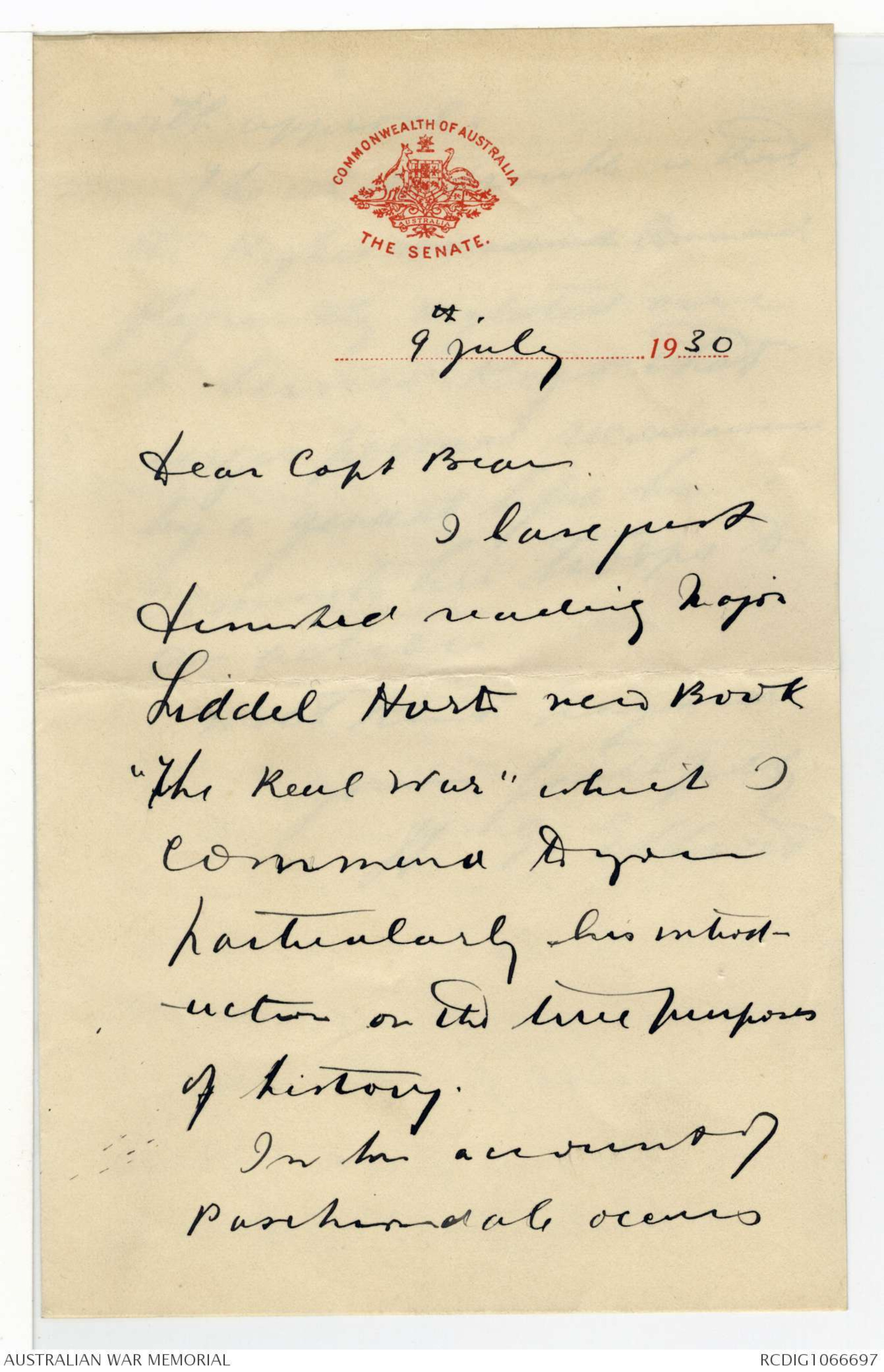
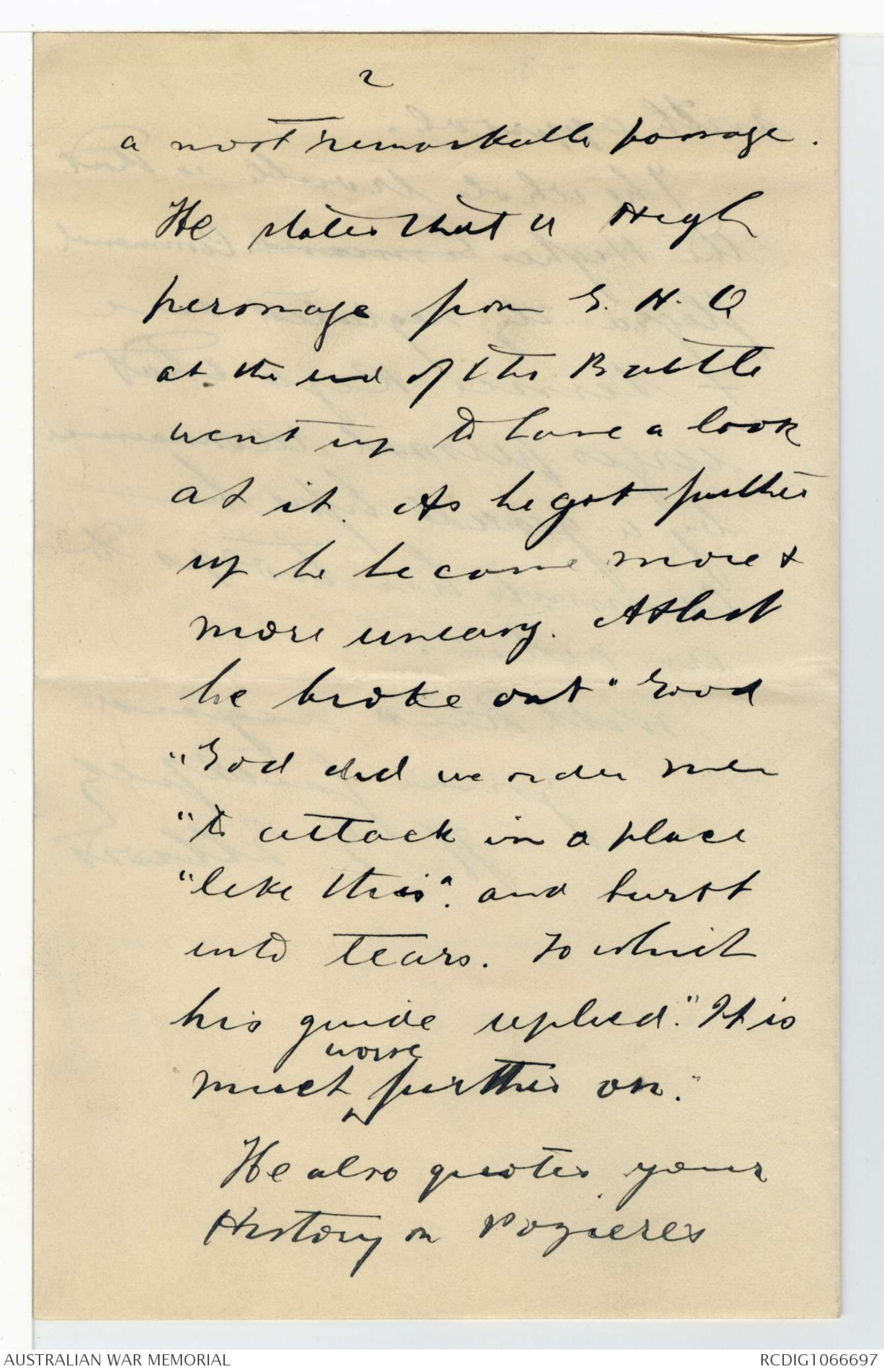
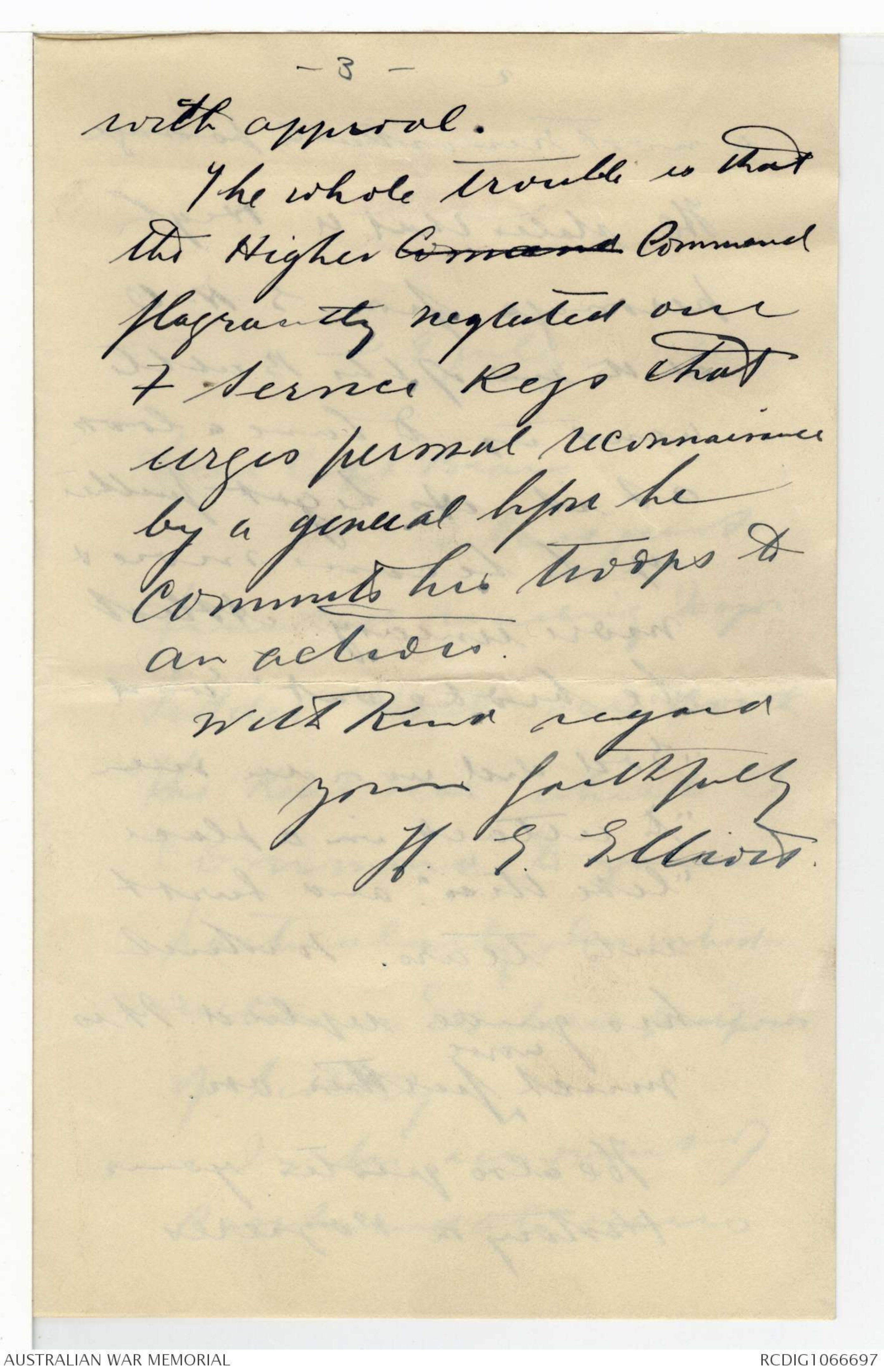
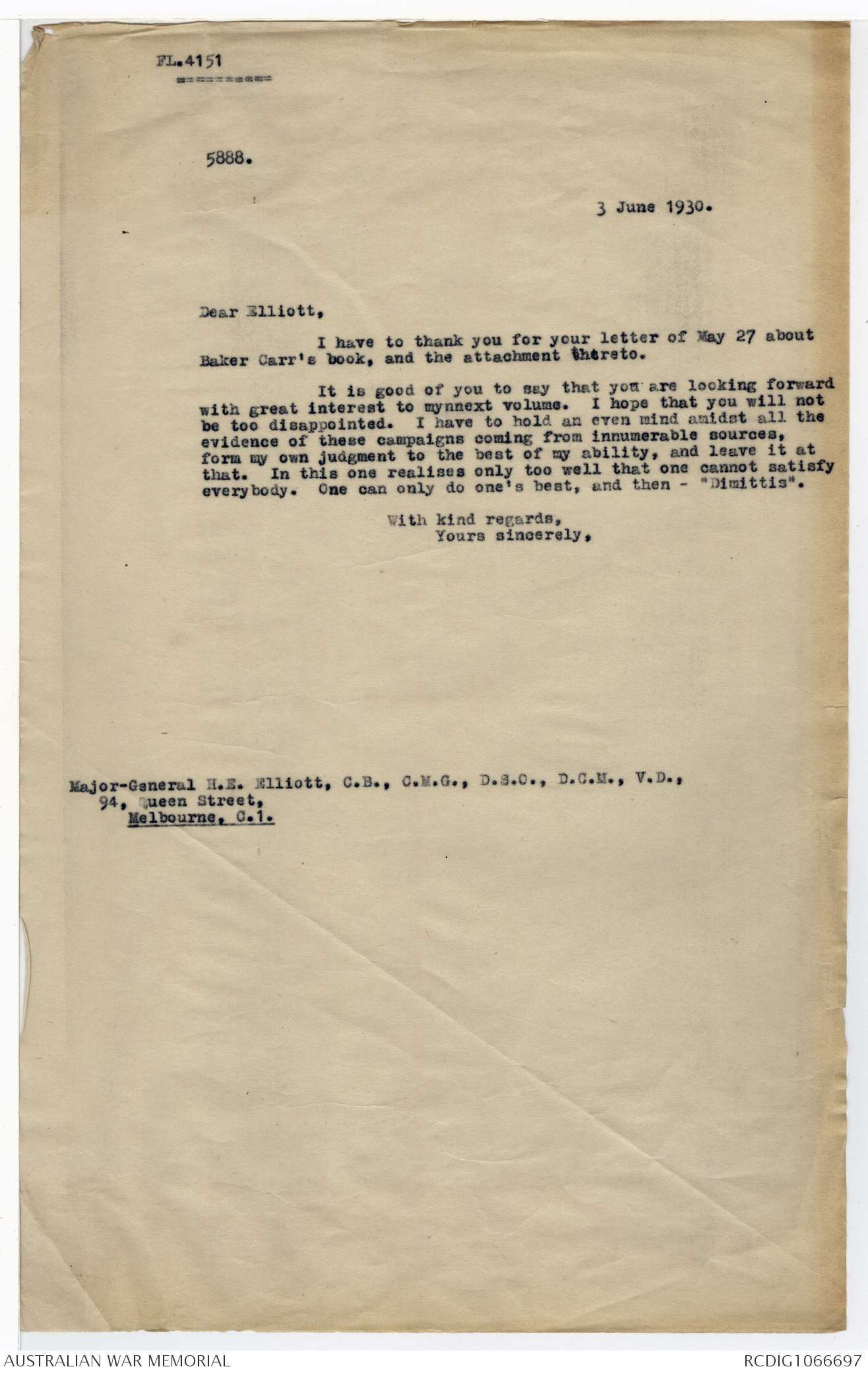
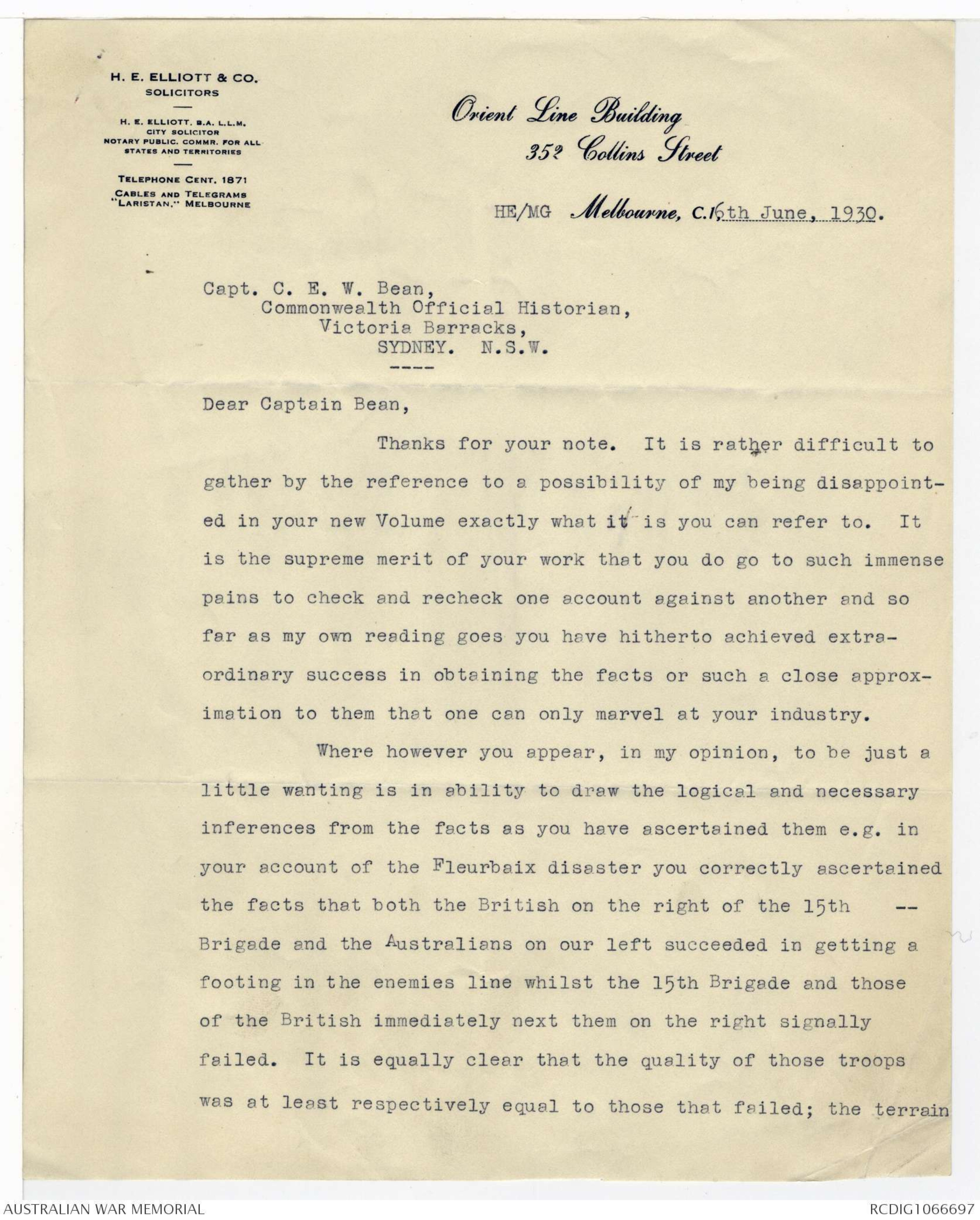
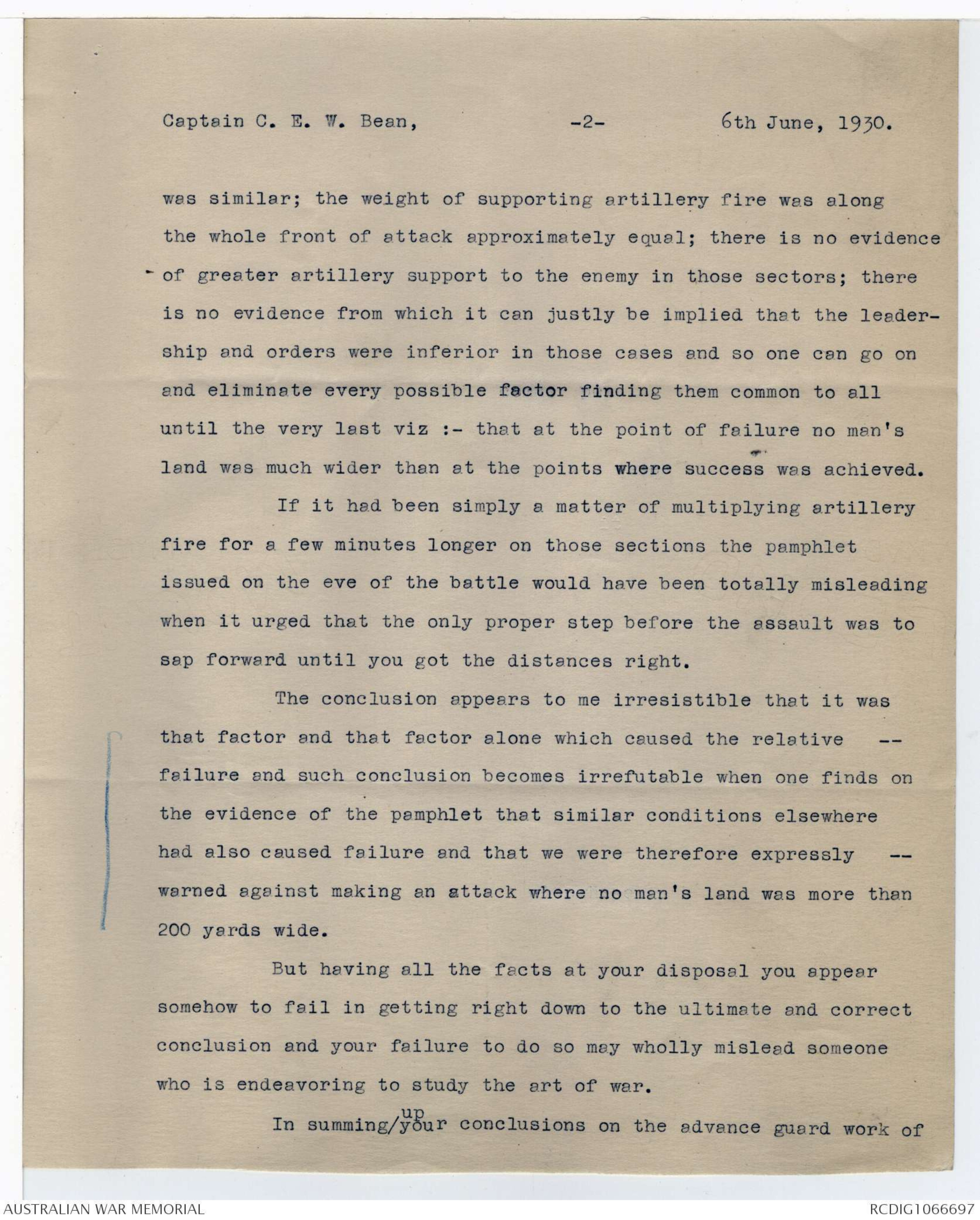
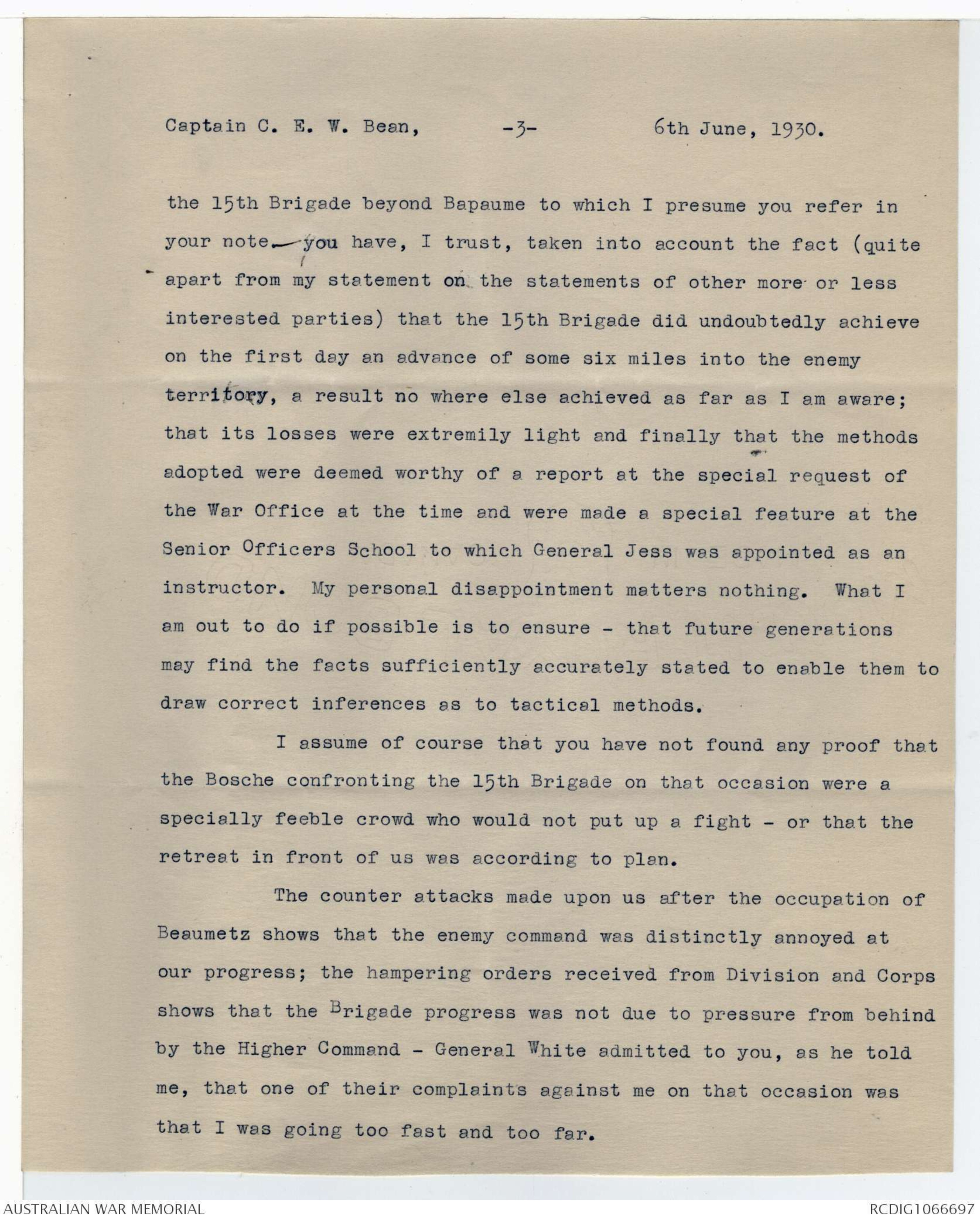
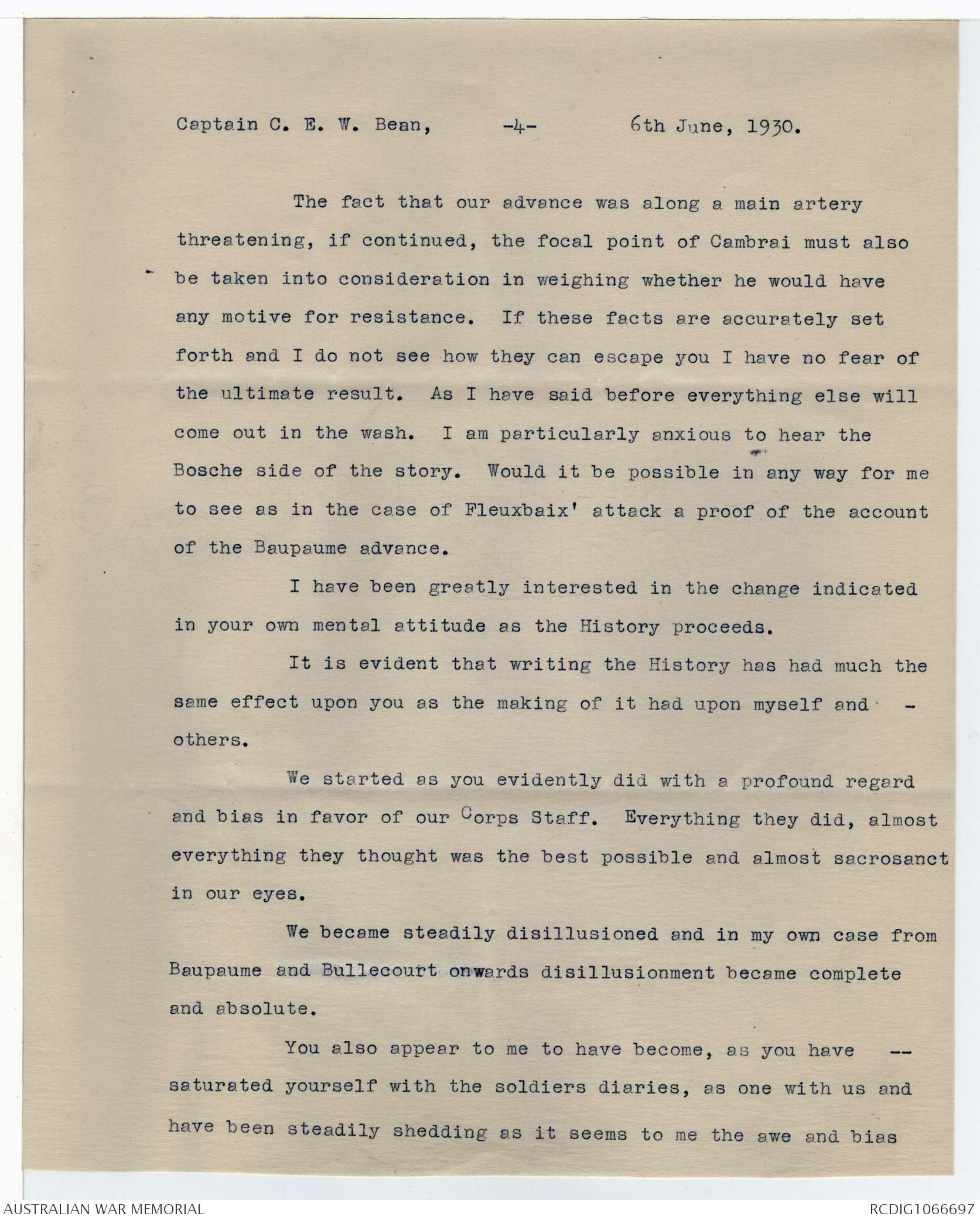
AWM38
Official History,
1914-18 War: Records of C E W Bean,
Official Historian.
Diaries and Notebooks
Item number: 3DRL606/261/1
Title: Folder, 1929 -7930
Comprises Bean's and A W Bazley's
correspondence with Brig Gen H E Elliott, mostly
dated 1929; includes copies of some letters to
Elliott from Sir Brudenell White and Sir John
Monash.
AWM38-3DRL606/261/1
GEN. ELLIOT'S NOTES, etc. No. 261
1st SET AWM38 3DRL 606 11L 261 [1]
DIARIES AND NOTES OF C. E. W. BEAN
CONCERNING THE WAR OF 1914- 1918
THE use of these diaries and notes is subject to conditions laid down in the terms
of gift to the Australian War Memorial. But, apart from those terms, I wish the
following circumstances and considerations to be brought to the notice of every
reader and writer who may use them.
These writings represent only what at the moment of making them I believed to be
true. The diaries were jotted down almost daily with the object of recording what
was then in the writer’s mind. Often he wrote them when very tired and half asleep;
also, not infrequently, what he believed to be true was not so —but it does not
follow that he always discovered this, or remembered to correct the mistakes when
discovered. Indeed, he could not always remember that he had written them.
These records should, therefore, be used with great caution, as relating only what
their author, at the time of writing, believed. Further, he cannot, of course, vouch
for the accuracy of statements made to him by others and here recorded. But he
did try to ensure such accuracy by consulting, as far as possible, those who had
seen or otherwise taken part in the events. The constant falsity of second-hand
evidence (on which a large proportion of war stories are founded) was impressed
upon him by the second or third day of the Gallipoli campaign, notwithstanding that
those who passed on such stories usually themselves believed them to be true. All
second-hand evidence herein should be read with this in mind.
16 Sept, 1946.
C. E. W. BEAN.
COMMONWEALTH OF AUSTRALIA
THE SENATE
9th July 1930
Dear Capt Bean
I have just
finished reading Major
Liddel Hart's new Book
"The Real War" which I
commend to you
particularly his introduction
on the true purposes
of history.
In his account
Paschendale occurs
2
a most remarkable passage.
He states that a High
personage from G.H.Q.
at the end of the Battle
went up to have a look
at it. As he got further
up he become more &
more uneasy. At last
he broke out Good
"God did we order men
"to attack in a place
"like this", and burst
into tears. To which
his guide replied. "It is
much ^worse further on."
He also quotes your
History on Pozieres
-3-
with approval.
The whole trouble is that
the Higher Comand Command
flagrantly neglected our
F Service Regs that
urges personal reconnaissance
by a general before he
commits his troops to
an action.
With kind regard
yours faithfully
H. E. Elliot
FL.4151
=========
5888.
3 June 1930.
Dear Elliott,
I have to thank you for your letter of May 27 about
Baker Carr’s book, and the attachment thereto.
It is good of you to say that you are looking forward
with great interest to mynnext volume. I hope that you will not
be too disappointed. I have to hold an even mind amidst all the
evidence of these campaigns coming from innumerable sources,
form my own judgment to the best of my ability, and leave it at
that. In this one realises only too well that one cannot satisfy
everybody. One can only do one’'s best, and then - "Dimittis".
With kind regards,
Yours sincerely,
Major-General H.E. Elliott, C.B., C.M.G., D.S.C., D.C.M., V.D.,
94. Queen Street,
Melbourne, C.1.
H. E. ELLIOTT & CO.
SOLICITORS
H. E. ELLIOTT. B.A. L.L.M.
CITY SOLICITOR
NOTARY PUBLIC. COMMR. FOR ALL
STATES AND TERRITORIES
TELEPHONE CENT. 1871
CABLES AND TELEGRAMS
"LARISTAN," MELBOURNE
Orient Line Building
352 Collins Street
Melbourne, C.1
HE/MG
6th June, 1930.
Capt. C. E. W. Bean
Commonwealth Official Historian,
Victoria Barracks
SYDNEY. N.S.W.
Dear Captain Bean,
Thanks for your note. It is rather difficult to
gather by the reference to a possibility of my being disappointed
in your new Volume exactly what it is you can refer to. It
is the supreme merit of your work that you do go to such immense
pains to check and recheck one account against another and so
far as my own reading goes you have hitherto achieved extra-
ordinary success in obtaining the facts or such a close approximation
to them that one can only marvel at your industry.
Where however you appear, in my opinion, to be just a
little wanting is in ability to draw the logical and necessary
inferences from the facts as you have ascertained them e.g. in
your account of the Fleurbaix disaster you correctly ascertained
the facts that both the British on the right of the 15th --
Brigade and the Australians on our left succeeded in getting a
footing in the enemies line whilst the 15th Brigade and those
of the British immediately next them on the right signally
failed. It is equally clear that the quality of those troops
was at least respectively equal to those that failed; the terrain
Captain C. E. W. Bean,
6th June, 1930.
-2-
was similar; the weight of supporting artillery fire was along
the whole front of attack approximately equal; there is no evidence
of greater artillery support to the enemy in those sectors; there
1s no evidence from which it can justly be implied that the leader-
ship and orders were inferior in those cases and so one can go on
and eliminate every possible factor finding them common to all
until the very last viz :- that at the point of failure no man’s
land was much wider than at the points where success was achieved.
If it had been simply a matter of multiplying artillery
fire for a few minutes longer on those sections the pamphlet
issued on the eve of the battle would have been totally misleading
when it urged that the only proper step before the assault was to
sap forward until you got the distances right.
The conclusion appears to me irresistible that it was
that factor and that factor alone which caused the relative --
failure and such conclusion becomes irrefutable when one finds on
the evidence of the pamphlet that similar conditions elsewhere
had also caused failure and that we were therefore expressly --
warned against making an attack where no man's land was more than
200 yards wide.
But having all the facts at your disposal you appear
somehow to fail in getting right down to the ultimate and correct
conclusion and your failure to do so may wholly mislead someone
who is endeavoring to study the art of war.
In summing/up your conclusions on the advance guard work of
Captain C. E. W. Bean,
6th June, 1930.
-3-
the 15th Brigade beyond Bapaume to which I presume you refer in
your note - you have, I trust, taken into account the fact (quite
apart from my statement on the statements of other more or less
interested parties) that the 15th Brigade did undoubtedly achieve
on the first day an advance of some six miles into the enemy
territory, a result no where else achieved as far as I am aware;
that its losses were extremily light and finally that the methods
adopted were deemed worthy of a report at the special request of
the War Office at the time and were made a special feature at the
Senior Officers School to which General Jess was appointed as an
instructor. My personal disappointment matters nothing. What I
am out to do if possible is to ensure - that future generations
may find the facts sufficiently accurately stated to enable them to
draw correct inferences as to tactical methods.
I assume of course that you have not found any proof that
the Bosche confronting the 15th Brigade on that occasion were a
specially feeble crowd who would not put up a fight - or that the
retreat in front of us was according to plan.
The counter attacks made upon us after the occupation of
Beaumetz shows that the enemy command was distinctly annoyed at
our progress; the hampering orders received from Division and Corps
shows that the Brigade progress was not due to pressure from behind
by the Higher Command - General White admitted to you, as he told
me, that one of their complaints against me on that occasion was
that I was going too fast and too far.
Captain C. E. W. Bean,
6th June, 1930.
-4-
The fact that our advance was along a main artery
threatening, if continued, the focal point of Cambrai must also
be taken into consideration in weighing whether he would have
any motive for resistance. If these facts are accurately set
forth and I do not see how they can escape you I have no fear of
the ultimate result. As I have said before everything else will
come out in the wash. I am particularly anxious to hear the
Bosche side of the story. Would it be possible in any way for me
to see as in the case of Fleuxbaix’ attack a proof of the account
of the Baupaume advance.
I have been greatly interested in the change indicated
in your own mental attitude as the History proceeds.
It is evident that writing the History has had much the
same effect upon you as the making of it had upon myself and -
others.
We started as you evidently did with a profound regard
and bias in favor of our Corps Staff. Everything they did, almost
everything they thought was the best possible and almost sacrosanct
in our eyes.
We became steadily disillusioned and in my own case from
Baupaume and Bullecourt onwards disillusionment became complete
and absolute.
You also appear to me to have become, as you have --
saturated yourself with the soldiers diaries, as one with us and
have been steadily shedding as it seems to me the awe and bias
 Sandy Mudie
Sandy MudieThis transcription item is now locked to you for editing. To release the lock either Save your changes or Cancel.
This lock will be automatically released after 60 minutes of inactivity.